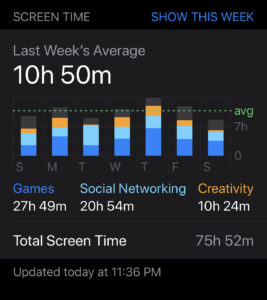I spend a lot of time on my devices and the internet in general. My average phone screen time is around about 11 hours on average per day. MY log for my daily device use on September 6th, 2020 is below. That doesn’t even include the time I spend playing Xbox and watching TV, Netflix, and YouTube. The time spent on my phone is only for personal fulfillment and communication with most of it being things like phone games. I don’t text or communicate with very many people on my phone just because I don’t like having semi-useless drawn-out conversations I think it is a waste of time. That being said I waste a lot of time playing idle and incremental upgrade games that are very time consuming and require I be actively fulfilling actions on my phone. All of the games I play run ads that are tailored to me as outline in “Propaganda Machine” and sometimes it gets to the point where I have to shut my phone off because I’ll be tired of looking at the same ads over and over again (O’Neil). Now some of them just require my phone to be on so I’ll have that open next to me when I’ll be doing homework and or watching TV. I find that being connected almost all of the time makes it difficult for me to do things like reading when my phone is buzzing next to me all the time. I solve this by just leaving my phone in another room and that solves my problems. It seems cliché to say that I’m not addicted to my devices but there are days where I spend all day on my phone and days I spend no time on my phone and I don’t even notice it. Apart from that I don’t and haven’t seen very many negative side effects from being connected to the network. For positives, I am able to reach out to people and do free-lance work for things like logo design and website optimization. Before finding some free things to access like website optimization I began to notice that making money online and from home has been heavily monetized. All these courses you should buy just to get access to. That reminded me heavily of the digital redlining and access article we read in class a pay to play sort of way (Gilliard). Being connected to the network makes that so much easier and also when I have questions on coursework I can use the help of the web and people I reach through my computer or phone to learn or guide me through whatever it is I need. Being on your devices all the time isn’t great but when they are being used in a productive matter is where things get fuzzy. A lot of money can be saved from going on YouTube and learning how to do something but a lot of time can be wasted on phone games as well. It is all about finding that delicate balance between addictions and nonexistent which I and I believe most others are trying to find.

7:24-8. Social media
9:15- 9:30 social media
9:45-10:30 reading on PC for class
10:30-11:07 phone games
12:12-1:40 xbox and phone
1:50-2:30 course work
6:15-12:30 phone games social media and watching the NBA playoffs
-D
Works Cited
Gilliard, Chris. “Privacy Program.” Common Sense Education, 24 May 2016, www.commonsense.org/education/privacy/blog/digital-redlining-access-privacy.
O’Neil, Cathy. “Propaganda Machine: Online Advertising.” Wlu.primo.exlibrisgroup.com, 2016, wlu.primo.exlibrisgroup.com/discovery/fulldisplay?docid=alma991010460823804161.
